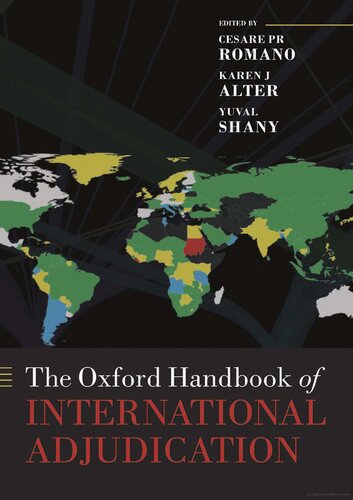Product desciption
The Oxford Handbook Of International Adjudication Cesare Pr Romano Karen J Alter Yuval Shany by Cesare P.r. Romano; Karen J. Alter; Yuval Shany 9780199660681, 0199660689 instant download after payment.
The post Cold War proliferation of international adjudicatory bodies and international adjudication has had dramatic effects on both international law and politics, greatly affecting international relations, particularly economic relations, the enforcement of human rights, and the criminal pursuit of perpetrators of mass atrocities. International courts and tribunals have become, in some respects, the lynchpin of the modern international legal system. The Oxford Handbook of International Adjudication uniquely brings together analysis of the legal, philosophical, ethical and political considerations brought about by these bodies. It provides an original and comprehensive understanding of the various forms of international adjudication. A series of cross-cutting chapters overview key issues in the field, both theoretical and practical, providing scholars, students, and practitioners with a detailed understanding of important legal and political influences within the international adjudicative process.
The Handbook is divided into six parts. The first part provides an overview of the origins and evolution of international adjudicatory bodies, from the nineteenth century to the present, highlighting the dynamics driving the multiplication of international adjudicative bodies and their uneven expansion. The second analyzes the main families of international adjudicative bodies, providing a detailed study of state-to-state, criminal, human rights, regional economic, and administrative courts and tribunals, as well as arbitral tribunals and international compensation bodies. The third part lays out the theoretical approaches to international adjudication, including from political science, sociology, philosophy, ethics, and the perspectives of developing countries. The fourth part examines some contemporary issues in international adjudication, including the behavior, role, and effectiveness of international judges, the political constraints that restrict their function, as well as the making of international law by international courts and tribunals, the relationship between international and domestic adjudicators, the election and selection of judges, the development of judicial ethical standards, and the financing of international courts. The fifth part examines key actors in international adjudication, including international judges, legal counsels, international prosecutors, and registrars. Finally, the sixth provides an overview of some selected legal and procedural issues facing international adjudication, such as evidence, fact-finding and experts, jurisdiction and admissibility, the role of third parties, inherent powers, and remedies.
The Handbook will be an invaluable and thought-provoking resource for scholars and students of international law and political science, and to legal practitioners at international courts and tribunals.


